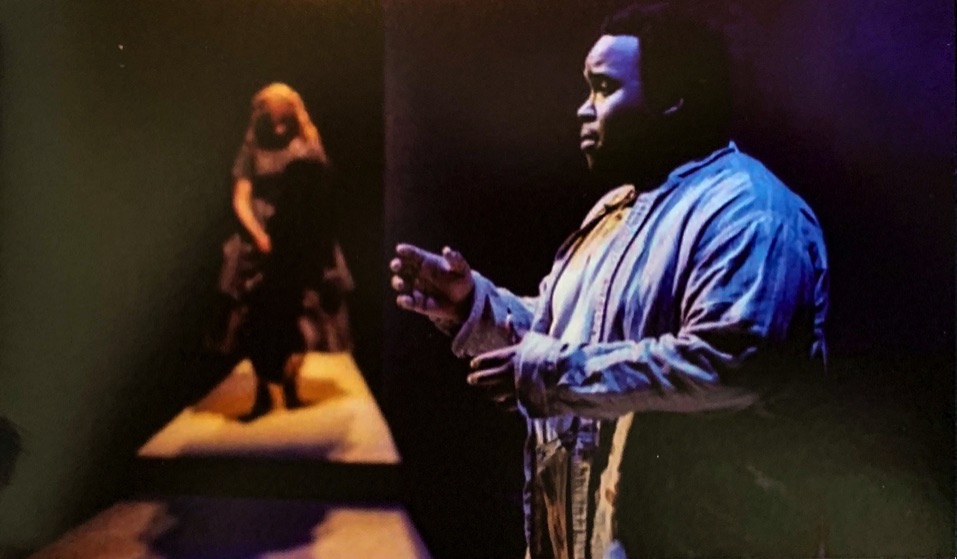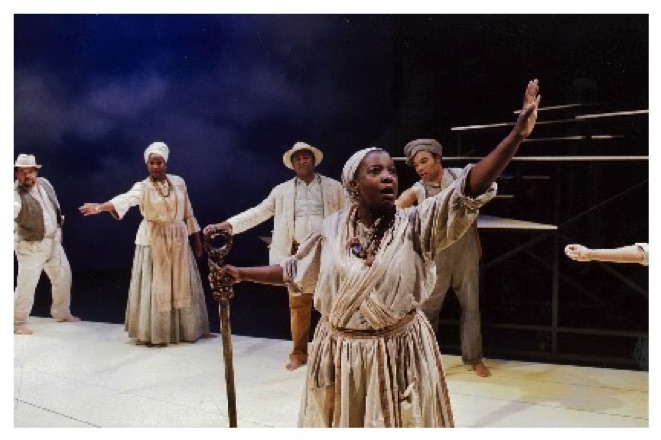
"Carey Perloff’s production was a traditional costume drama, which meant it was shocking. Slaves were slaves and an overseer, an overseer. We had to deal with history of what is and what is not. The slaves find a mystical explanation. A white judge hopes to settle a property dispute with reason, the most artificial justification under the circumstances. Mrs. Williamson loses her mind. The Williamson girl has an inkling of the parallel universes that physicists are now beginning to conjure up."
–– L.A. TIMES
"The piece grew out of my work as Composer in Residence at the American Conservatory Theater in San Francisco. ACT’s visionary artistic director Carey Perloff had a hunch that her Composer in Residence and her Playwright in Residence might get along. She was right, and that playwright was Mac Wellman. She commissioned us to find a project to do together, something that would bridge the opera and music theater worlds, something that would in some way relate to San Francisco.
I chose to make an orchestra out of the Kronos Quartet, a San Francisco institution if ever the was one, but it was Mac’s idea to look for a story by the writer Ambrose Bierce. Bierce was a cranky journalist and storywriter who had served in the Civil War and had come to San Francisco after. His work often has a kind of spooky feel to it; his stories often give you the feeling that if you could examine closely the most ordinary objects that surround us you would uncover a mystery that would throw your world completely out of balance. It is somehow fitting that one of his most famous contributions to world culture isn’t really even by him – the classic Kurasawa movie Rashomon – in which several participants in a horrifying event each recount a different version of what happened - is based on a Japanese story that was itself a re-imagining of a story by Bierce.
That Rashomon idea is a kind of presence hovering over our opera as well. Bierce’s original story “The Difficulty of Crossing a Field” is less than a page long, and yet in that short space it manages to tell the same story twice, with contradictions and creepiness lurking underneath all the details that remain unexplained by story’s end. The story is very simple – a slave owner in the pre-Civil War American South walks across his field and disappears, in plain view of his family, his employees and his slaves, forever altering the relationships among them. Everyone around him has his or her own sharp view of what that disappearance means, of why it had to happen, and of what will happen now that there is a "hole" where a man used to be. No one knows the truth. Perhaps there is no truth. But there are infinite possible consequences, and only by continuous examination of what few details are known can any sense of order be restored. I say ‘sense of order’ because all the continuous examination doesn’t actually get you any closer to the truth. Whatever that is. But we are compelled to examine continuously nonetheless.
The idea of composing a piece that bridged musical worlds extended to the kind of voices I wrote for – the role of Mrs. Williamson, who is a kind of center of the opera, is intended to be from the more traditional opera world, and was sung in the premiere by the diva Julia Migenes. But the other roles call for different kinds of voices – there is a kind of twisted spiritual that I imagined Mahalia Jackson singing, when I wrote it, and there is the more music theater role of Virginia Creeper, a leader of the field slaves, which was sung in the premiere by Anika Noni Rose, who went on to win a Tony Award for her performance in Caroline, or Change. And there is an actor, who never sings at all."
–– DAVID LANG, COMPOSER
CAST
JULIA MIGENES
ANIKA NONI ROSE
PAMELA DILLARD
MICHELLE E. JORDAN
FREDERICK MATTHEWS
DAVID RYAN SMITH
FRED WINTHROP
JACOB MING TRENT
MARCO BARRICELLI
RANDALL GREMILLION
LIANNE MARIE DOBBS
CREATIVE TEAM
KATE EDMONDS, SCENERY
DAVID F. DRAPER COSTUMES
NANCY SCHERTLER LIGHTING
GARTH HEMPHILL, SOUND
RICK ECHOLS, WIGS AND MAKEUP
KATHRYN CLARK & MERYL LIND SHAW,
CASTING
SARAH O'CONNELL, ASSISTANT DIRECTOR
THE DIFFICULTY OF CROSSING A FIELD, A.C.T., 2003, Lianne Marie Dobbs
Jacob Ming-Trent, Photo by Kevin Berne
THE DIFFICULTY OF CROSSING A FIELD
An Opera in Seven Tellings
Based on a short story by Ambrose Beirce
Music by David Lang
Libretto by Mac Wellman
Performed by Kronos Quartet
A.C.T. 2003

Cast of THE DIFFICULTY OF CROSSING A FIELD, A.C.T., 2003, Photo by Kevin Berne